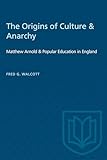The Origins of Culture & Anarchy : Matthew Arnold & Popular Education in England / Fred G. Walcott.
Material type: TextSeries: HeritagePublisher: Toronto : University of Toronto Press, [1970]Copyright date: ©1970Description: 1 online resource (190 p.)Content type:
TextSeries: HeritagePublisher: Toronto : University of Toronto Press, [1970]Copyright date: ©1970Description: 1 online resource (190 p.)Content type: - 9781487572785
- 9781487575724
- 821.8 23
- PR4023 .W353 1970
- online - DeGruyter
| Item type | Current library | Call number | URL | Status | Notes | Barcode | |
|---|---|---|---|---|---|---|---|
 eBook
eBook
|
Biblioteca "Angelicum" Pont. Univ. S.Tommaso d'Aquino Nuvola online | online - DeGruyter (Browse shelf(Opens below)) | Online access | Not for loan (Accesso limitato) | Accesso per gli utenti autorizzati / Access for authorized users | (dgr)9781487575724 |
restricted access online access with authorization star
http://purl.org/coar/access_right/c_16ec
Matthew Arnold stands before the world as a towering literary figure whose essays, particularly Culture and Anarchy, have a deep social and political significance. But there is another aspect of his life. For thirty-five years Arnold was an inspector of elementary schools, and during the time he served on several Royal Commissions, which entailed his study of the schools and universities on the COntinent. This work required him to write many official reports, some of which he ublished on his own initiative, others of which were published by societies which recognized their popular value. The author contends that the origins of Culture and Anarchy, and of some of the other literary essays, are to be found in these reports. A thoughtful examination of both the reports and the essays shows that the ideas presented is both have a close consanguinity; the ideas Arnold developed in his study of the schools are expanded and re-enunciated in the literary essays. His reflections are basically pragmatic, and their origins he is the problems he confronted in his work. He ornamented these practical observations with the treasures gathered from a fine classical education. The essays contain countless literary allusions which reflect upon his current thoughts his deep sense of an endless social continuum. Herein lies his literary genius. Nevertheless, it is important to know that these different aspects of Arnold's life merge -- that the universe of his mind preseved its rational connections with all of the experiences he suffered or enjoyed. Viewed together, they present a fair prospect of inductive resoning -- of useful knowledge applied to the selection of present problems. Professor Walcott gives a clear a succinct account of Arnold's plans for the improvement of English education, and provides an informative context for many of his letters. He delves deep into the history of popular education in England and Arnold's part in it, and in so doing gives a warm, human portrayal of Matthey Arnold and his hopes and frustrations as a superintendent.
Mode of access: Internet via World Wide Web.
In English.
Description based on online resource; title from PDF title page (publisher's Web site, viewed 01. Nov 2023)


